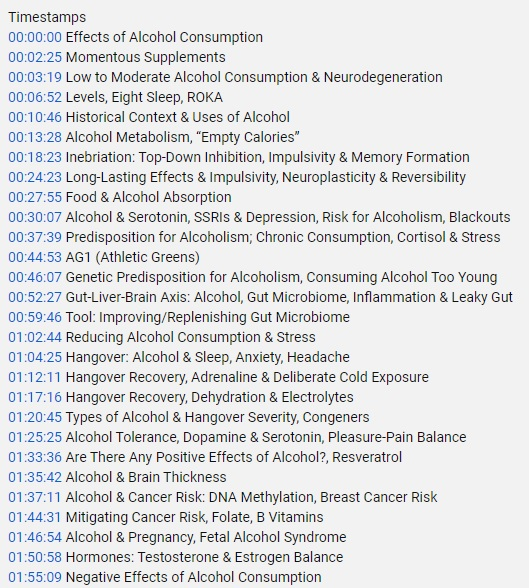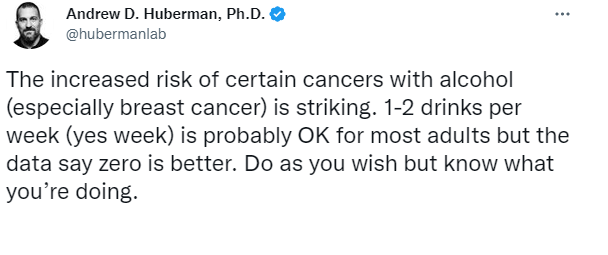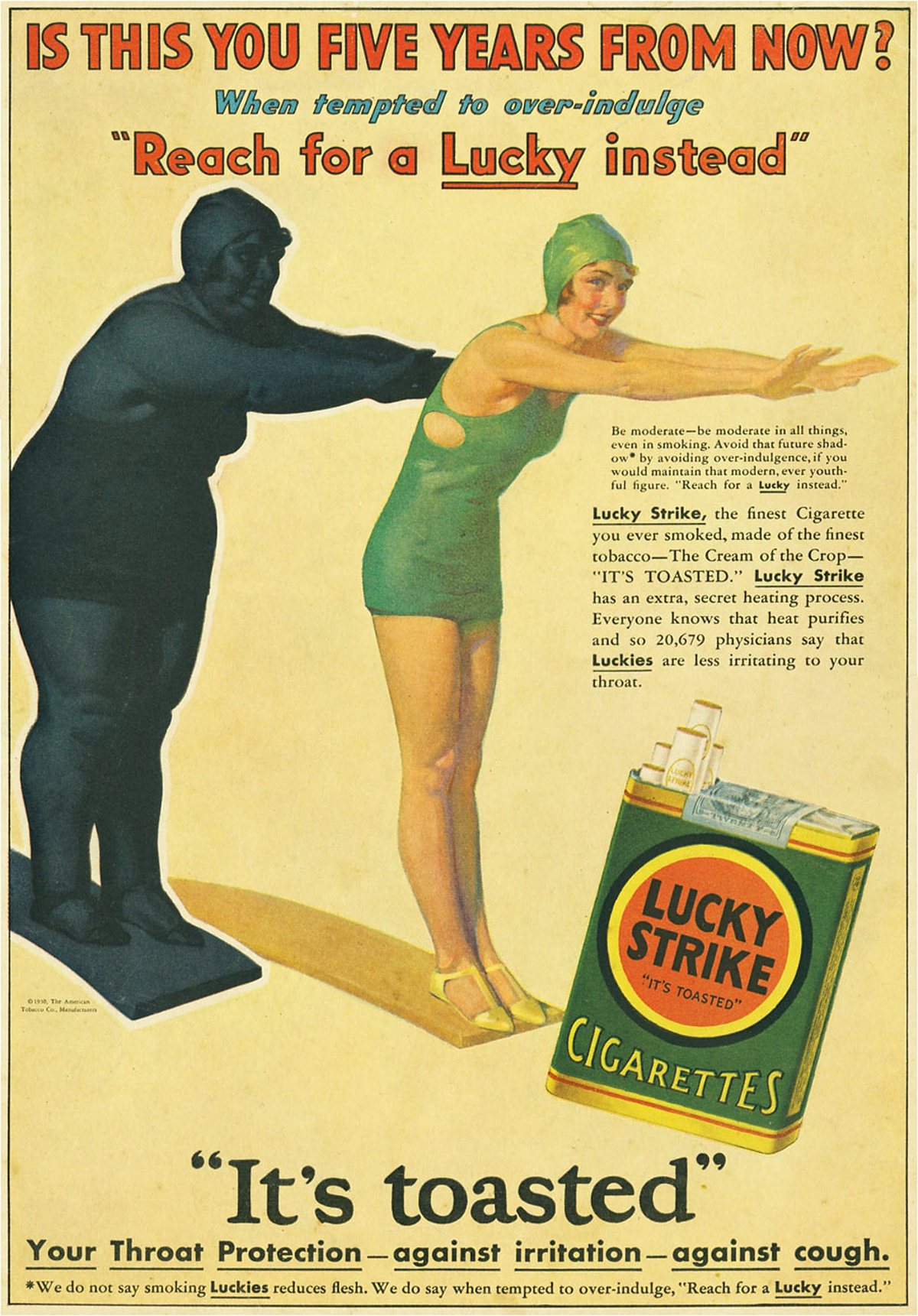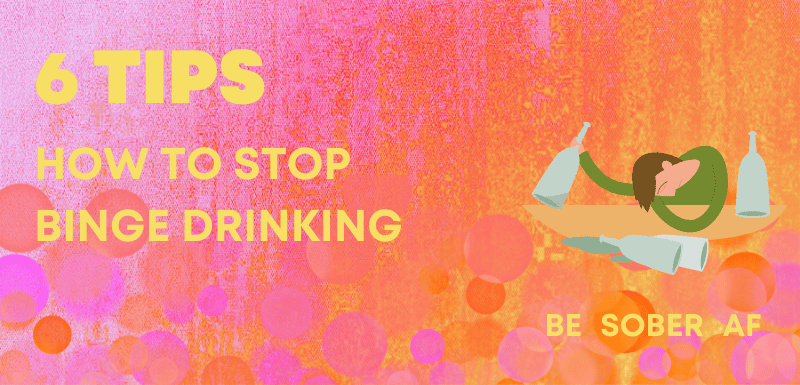6 Tips: How to Stop Binge Drinking
No one likes waking up the morning after, having only a vague recollection of how the evening was spent. The only thing worse is, well, the actual recollection of the multitude of ways in which you embarrassed yourself. Do you ever wonder why it seems like everyone else around you is able to drink alcohol, without taking it too far? Do you worry about memory loss (aka blackouts)? Do you make silly or maybe even high risk decisions when you’ve had too many? Spending money you don’t have, or going home with someone you don’t know, knowing full well if you’d been sober, you wouldn’t have done it? Well, binge drinking could be responsible for all of the above and much more.
WARNING: If you are worried you might be dependent on alcohol, you should seek medical advice to help you stop your drinking safely. Alcohol withdrawal is very real and very dangerous.
In this article we look at what binge drinking is, the impact it has on your health and how to stop binge drinking completely.
Some links in this article are affiliate links. If you make a purchase, you’ll be supporting this platform at no extra cost to you—thank you!
- What is Binge Drinking?
- How is Binge Drinking harmful?
- How to stop binge drinking
- 1. Discover Your Why
- 2. Drink Mindfully
- 3. Take a Break
- 4. Drink Low or Non Alcoholic
- 5. Go Out Out
- 6. Talk to Someone
- How to Stop Binge Drinking – Final Word
- FAQ
- Why are the dangers of alcohol not more widely publicised?
- What other resources can I use?
- Where Can I get More Information or Support?
What is Binge Drinking?
The ONS defines binge drinking as exceeding 8 units for men & 6 for women, in one sitting.
For men, that could look like any one of these:
- 3.5 pints of Fosters
- 3.5pints of Guinness
- 4 double JD’s
- 2.5 large glasses of wine
And for women:
- 3 pints of Fosters
- 3 pints of Guinness
- 3 double JD’s
- 2 large glasses of wine
You read that right. For women, just 2 large glasses of wine constitutes as binge drinking. Drinkaware have lots of useful information about binge drinking you can read here if you wish to. But ultimately, binge drinking occurs when someone is drinking too quickly for their body to process the alcohol – or drinking to get drunk.
How is Binge Drinking harmful?
In recent years, alcohol in general has been shown to be extremely detrimental to our health. With proven links to cancer, you only need to look at the time stamps of Dr. Huberman’s alcohol focussed podcast to get an idea for how it might be impacting both your physical & mental health.

Alcohol:
- Increases impulsivity – EVEN when you’re sober
- Impacts memory formation
- Decreases mental health – (cause of depression & anxiety)
- Impacts gut microbiome
- Causes stress
- Reduces sleep quality
- Can imbalance hormones
- Increased risk of cancer
Now, let’s not overlook the effects on the gut microbiome & reduction in sleep quality – these two have a major impact on the overall running of our bodies. Recovery happens while we sleep, in fact, sleep really is the foundation to all of our health. In Dr. Matthew Walker’s book, Why We Sleep, we find out that even one drink with dinner is enough to impair our sleep that night! Our body working hard to process the alcohol, steals the attention away from other maintenance jobs in the body. Our gut microbiome can impact how well we absorb nutrients & vitamins vital for our health which if impaired, could be causing fatigue amongst other things.
I recommend watching or listening to Dr. Huberman’s podcast about alcohol in full here, but for the cancer related clips follow this link. The podcast is also available on Spotify.

So, with alcohol being as harmful as it is even when moderated, it is clear that binge drinking will not be doing you any favours – and I’ve not even mentioned the hangovers!
How to stop binge drinking
1. Discover Your Why
First things first, it’s important to understand the reasons why you drink.
Remember: The reason you drink is not necessarily the reason you get drunk… You might drink because you feel stressed, but you might get drunk, because after one or two, you lose the ability to moderate.
This is completely normal. Alcohol is an extremely addictive substance that makes us want more of it and it is not something you should feel bad about. Some people are simply more susceptive to the effects of alcohol. We’re wired to want more & struggle to find the off switch.
So, why do you drink? Some common reasons for drinking are as follows: celebrating, commiserating, feeling stressed, tired or sad. To lower our inhibitions ie, to dance, or sing in public, or as social lubrication ie talking to strangers. To make us feel more bold, brave or even just to relax.
If you’ve been drinking alcohol for a while now, you may have accidentally developed a psychological dependence on it. Alcohol becomes a sort of crutch we use to go through our day to day, leaning on it when we think we need to and then eventually out of habit.
The key to minimising our alcohol intake, is to look at these reasons & make a decision to face life head on, without the help of our toxic frenemy. Because the truth is, alcohol is not helping you. We’ve all seen it ruin events, it causes stress physically rather than reducing it, it makes us more tired, more sad. It does lower inhibitions, yes, but often we regret that the next day!
If you need some help delving into the why, I recommend completing the 100 day sober curious reset journal by Ruby Warrington.
2. Drink Mindfully
I won’t lie to you, this is not an easy task! But, it can be really eye opening and I recommend doing this for 1 month & keeping a journal whilst you go through the process. Really try and stick to this, what is 1 month out of your life?
Here are a list of things to pay attention to over the 4 weeks:
- When do you crave alcohol – what’s happening physically & emotionally?
- When you have a drink, pay attention to the strength & size. Can you adhere to the NHS unit allowance? (14 units of alcohol per week, spread over 3 days i.e. 4 days not drinking).
- Are you drinking out of habit?
- What do the drinks taste like? Do you enjoy them all?
- Do you experience any peer pressure from ‘friends’ to drink?
- What concerns do you have about being sober at events?
- How do you feel physically when you drink alcohol? Do you experience increased heart rate, perspiration, lack of concentration or anything else?
- Do you like how 1 drink makes you feel?
- How do you feel the morning after 1 or 2 drinks vs 2 nights without alcohol?
- Is life going smoother with your reduced alcohol intake?
If you’ve made it through the 4 weeks successfully moderating your intake, hopefully you have gained some insights into your drinking habits & can use this moving forward. Believe me, slipping back into old binge drinking habits happens so quickly & quietly you may well be shocked in another 4 weeks time. This is why it’s important to document the process, so you have a reminder of the lessons your learnt & how life improved without hangovers!
3. Take a Break
Particularly if you struggled with number 2 – drinking mindfully. I’ve said it before and I’ll say it again, there is no shame in being unable to moderate alcohol. It is completely normal. If you tried your hardest to lower your intake but found that after one of two you’re at the bar ordering rounds of tequila, it might be time to consider taking an all out break from booze.
It might feel daunting, it might feel like your life is over – believe me when I tell you that you will see the irony in this one day. If alcohol was really delivering everything you’ve been led to believe, then why are you here reading this article? Alcohol kind of sucks. But, change is scary. That’s why we resist making big decisions like this. Resistance is the roadblock to growth. Be bold. Be ready to live your life differently & to feel more fulfillment in the everyday.
For more tips on how to quit drinking alcohol check out this article, 9 top tips: how to give up alcohol for a year. Don’t worry if you’re not ready to ready to give up for that long, the tips will help you regardless of how long you decide to stop for.
4. Drink Low or Non Alcoholic
You can do this alongside point 2 to keep your units down, or alongside point 3 if you’re taking a complete break. Low alcoholic drinks (normally up to 0.5%) are not strong enough to cause any physical effects on the body so you won’t have to worry about feeling tipsy and deciding you need more alcohol! That is one of the biggest perks to being sober – being in charge of your decision making!
Not everyone thinks low or no drinks are a good thing, because they can act as a crutch as well. However, they are a non toxic, non detrimental crutch. Being in a busy pub with a 0% beer bottle in your hand can really work wonders for your confidence. People also don’t generally notice that you’re not drinking, so it takes the spotlight off of you. Generally, AF alternatives are pretty good & are constantly improving as the market is set to expand exponentially (believe it or not, the younger generation are drinking less and less).
So, if you’re headed on a night out, why not give the alcohol free drinks a go? You might be surprised (especially during Dry Jan) to see how many other people are out & not drinking.
Check out our top AF gins & prosecco for some low & no drink inspiration.
5. Go Out Out
How do you spend you leisure time? Are you always found in a pub? Or heading out on a Friday night to bars and clubs? It’s a right of passage for many of us & perhaps we get a little stuck into the habit.
Have you ever stopped and asked yourself if you really enjoy spending your time this way? One sure way to figure this out, is to go out – SOBER!
You might find that all of a sudden nightclubs smell funny & aren’t that great. Or that heaving, loud bars make you feel anxious. These factors may be unconsciously driving you to drink more – so that you can tolerate the event better and convince yourself you’re having fun!
Doing your regular nights out sober can really highlight some of the reasons why you’re drinking alcohol to excess. You might realise it’s time to start spending your weekends a bit differently. Now is the perfect time to figure out what that might look like.
6. Talk to Someone
If all of your friends & family drink, it can make it that step harder to take a break from alcohol, or to change your drinking habits at all. In fact, it can feel quite isolating. You may have discovered you actually drink as much as you do because others around you are… whilst it may not be your instinct to put yourself first, you have every right to do so. Your health should come above anything else and anyone that loves you, should (in a perfect world) accept that.
Hopefully you have a loved one you can share your concerns with. Confide in them & let them know you want to stop binge drinking. You might find that they feel the same way and you could get some solid in person support from them.
If for whatever reason you don’t feel like you can talk to anyone in your life about this, fear not. And, even if you do, I still recommend the following.
Get online! There are a number of support groups out there that are easy and free to join. Chat with likeminded people, get advice and even offer your own support to others. The sober community is like no other. You can also set up an an Instagram account (anonymously if you prefer) to follow other sober accounts & receive daily motivation or accountability. There are thousands of people every day deciding they need to take a closer look at their relationship with alcohol & there’s an enormous amount of help out there.
If it’s an option for you, seeking professional help from a therapist or counsellor could also benefit you greatly at this point in time. Check out our resources page for links to support groups, charities and ways to find a therapist.
How to Stop Binge Drinking – Final Word
Binge drinking is dangerous & can lead to some serious health problems, including alcohol addiction. Our brains can reverse the effects of alcohol after just 6 months of abstinence – increasing our neuroplasticity & allowing us to think in novel ways rather than being stuck in the same thought patterns alcohol pigeonholes us into. However, we can’t unlearn our drinking habits which is why oftentimes, even after a lengthy break from alcohol, our drinking returns to the way it was before. This is why we hear that alcoholics can’t even have one.
But, every attempt at moderation and every break you take is a step forward for your health may lead to the decision to give up alcohol completely in the long run. The point is to be mindful and aware of what’s going on. Quitting when you don’t want to stop, is difficult and working hard to shift your mindset around alcohol will make everything easier. You need to be fed up and ready for a change if you want to process to be easy. I hope the above steps help you to arrive at that point.
FAQ
Why are the dangers of alcohol not more widely publicised?
The alcohol industry is enormous – hello we literally have venues up and down the country specifically for serving us alcohol. Last year the UK gov received £13.1 billion in tax from alcohol sales. But alcohol only costs the NHS £3.5 billion.
We’re lucky that rules apply so that we can’t be fed BS like in the ad below – but we are still sold alcohol as a lifestyle. More often than not, a positive one. There’s drinking in the shows & films that we watch, it’s glamourised, edgy & funny far more than it is accurate. Just once I’d like to see an alcohol advert with an actual drunk person in it. But unfortunately, that doesn’t sell.

What other resources can I use?
Firstly, check out our resources page for links to support groups & charities. If you’re more inclined to carry out the process solo, then check out our article ‘7 quit lit books that will change your life‘. There are also plenty of podcasts you can listen to for free. The trend in alcohol consumption is truly declining and more people are turning to an alcohol free life – which thankfully means there has never been a better time to try sober.
Where Can I get More Information or Support?
For links to charities, sober community groups, helplines or sites to locate therapists check out our resources page here.
